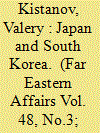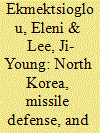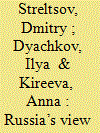|
|
|
Sort Order |
|
|
|
Items / Page
|
|
|
|
|
|
|
| Srl | Item |
| 1 |
ID:
175937


|
|
|
|
|
| Summary/Abstract |
This paper is concerned with the complex problems in relations between Japan and South Korea, rooted in the colonial rule of Japan on the Korean Peninsula. These include the territorial dispute over a group of islets in the Sea of Japan, the issue of Korean "comfort women," Seoul's claim to rename the Sea of Japan as the East Sea, the claim for compensation for Koreans who were mobilized for hard work in Japanese companies during the war, and others. We conclude that growing tensions in ties between Japan and South Korea are weakening the Japan-US-South Korea military-political alliance triangle, which could lead to a change in the balance of power in Northeast Asia.
|
|
|
|
|
|
|
|
|
|
|
|
|
|
|
|
| 2 |
ID:
185984


|
|
|
|
|
| Summary/Abstract |
This article examines the relationship between US missile defense and the US-China security dilemma dynamics by developing the concept of diffuse signaling involving the Korean peninsula. We argue that the US’ efforts to bolster deterrence against North Korea’s growing threats through missile defense have resulted in China’s countermeasures of enhancing survivability and penetrability of its second-strike capability, leading to downward spirals of tensions between Beijing and Washington. We explain how three structural factors – geography, the US alliance system, and nuclear asymmetry – have made diffuse signaling salient, thus making it very challenging for the United States to reassure China even when its actions targeted North Korea. The article empirically shows the action-reaction process through which China and the US have come to experience the aggravation of the security dilemma over the Korean peninsula.
|
|
|
|
|
|
|
|
|
|
|
|
|
|
|
|
| 3 |
ID:
157761


|
|
|
|
|
| Summary/Abstract |
The article focuses on Russia’s approach to international security in Northeast Asia.
It argues that Russia’s unique position is that it is not a party of any major security–
political conflict, takes a neutral position on territorial conflicts as best suiting its
interests of promoting cooperation with all East Asian states and objects to the
involvement of third parties. Russia is involved only in a dispute with Japan where
it demonstrates a flexible position. As a comparatively weak regional player, Russia
is interested in maintaining peace, stability and the status quo, in particular on the
Korean Peninsula, and has no revisionist agenda in East Asia. Major elements of
Russia’s approach include creating an inclusive, open, transparent and equitable
regional security architecture, support for polycentric regional order with Russia
as one of the major centers of power, criticism of the U.S.–sponsored MBD as
well as focus on a strategic partnership with China. Intensifying its Asian pivot,
Moscow is increasingly concerned with the tensions on the Korean Peninsula
where it promotes denuclearization, dialogue between the two Koreas, resumption
of the Six–Party Talks and opposes to the dangerous actions of all parties. Russia
and China advocate a “moratorium for a moratorium” proposal as the only way to
mitigate tensions and create a common security mechanism.
|
|
|
|
|
|
|
|
|
|
|
|
|
|
|
|
|
|
|
|
|